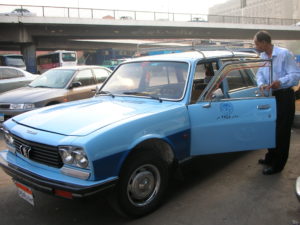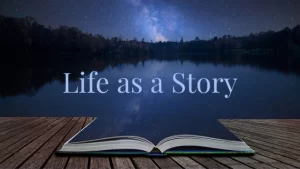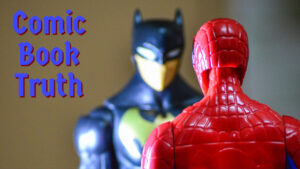
By Cathy Eck
Egyptian Taxi Drivers
I’ve traveled all over, and I’m very trusting of taxi and bus drivers. It is a rare occasion when I don’t thoroughly enjoy being driven. I love soaking in the scenery and snapping an occasional photo. But my foot is usually pressed tightly to the floor, as if I can stop the taxi with my imaginary brake, when I ride with Egyptian taxi drivers. They never stay in the lines. They pass on the left, right, the shoulder, and occasionally slide between two cars right down the center. They are always going faster than the person in front of them. And a one-way street is just an opportunity for a battle of wills to determine which way is the one way.
So I wasn’t surprised when my friend, Alison, and I got yet another cab driver from hell for a quick trip to Cairo’s Egyptian Museum. We chose our driver, Hasan, based on his willingness to meet our price. As he pulled out of the driveway, Alison and I looked at each other in shock. Both of us have been to Egypt many times, but never had we been with a driver like this. With no seat belts or airbags, we were holding on to anything that seemed to be bolted down. The one thing Hasan did have was a horn; and he didn’t hold back from using it.
What Can We Do to Fix This?
Our first idea was to talk to him and share our concern. We gently explained to him how frightened we were. He kindly and confidently responded. “I have been driving for 27 years and have never had an accident.”
“We don’t want to be your first,” we responded with forced laughter. He didn’t get the joke.
At first, we just didn’t believe him; we thought he was lying to get our money. But then our hearts pushed us to look for evidence that he was telling the truth. And besides, we were getting very tired of being afraid.
Alison noticed that his car was very clean. I noticed that there were no big dents on his car. I also noticed his car was a BMW–somehow that gave me comfort. Alison noticed he had expensive sun glasses. In a way, our minds were trying to make him familiar or like us so we could trust him. As we calmed our nerves, we both noticed that he was very focused. He actually leaned into the wheel as if to exercise an extra level of control.
Hasan Genuinely Cared
We got to Cairo, and Hasan parked the car. Then he walked us across the dangerous Cairo streets to the museum. This man was growing on us. He really did seem to have our best interests at heart. Just before we got back to the cruise ship, Hasan looked at us in the rear-view mirror and said, “Did you like my driving?”
We didn’t lie. “To be honest,” we said, “You still drive too fast for us.”
“Yes, Americans say I’m a crazy driver,” he said emphasizing the word crazy. “But you see, I am a professional driver. I know exactly where I am in relation to all the other cars. I have never wrecked; and I never will wreck because when I drive, I only think about driving.”
We paid him, thanked him, and headed back to the ship. Land felt so solid and good. I went back to my room and turned on the television, but I could not get Hasan out of my mind. I laid in bed contemplating why I could not enjoy that ride; and more important, why I didn’t completely trust Hasan.
The Beliefs that Kept me From Trusting Hasan
I noticed that I had some thoughts that Muslims don’t value life as much as others. After all, they have suicide bombers. How stupid that sounded. Fortunately, I know that minds repeat crap that they hear; I know better than to believe what my mind says if it doesn’t match my heart. Hasan mentioned his concern for our safety several times. He walked us across the street to make sure we were safe. When his wife called, he handed the phone to Alison and said “Talk to her, I’m driving; and she likes to talk to Americans.” So clearly, nothing in his culture or religion made him unsafe. I could reject all of those thoughts as pure garbage.
Then I realized that I had been trained to drive like an American. I was taught that a good driver drives in his or her lane. A good driver signals when they turn or change lanes. A good driver stays within the speed limit. And a good driver only uses their horn when necessary. A bad driver is one that breaks the rules. I realized that my categorization of a good or bad driver was all about the rules. Someone in the past determined what was safe and made the rules, and I was then trained to believe that following those rules meant I would be safe. But now I was questioning my bias. Was I really safer in America where we had strict driving rules and most of the people followed them?
Do Rules Keep Us Safe?
Several times in my life, I received tickets for breaking the rules. But the first thing that crossed my mind as the policeman wrote up the ticket was that I was not doing anything unsafe. Often, I fell prey to a reduced-speed zone that made no sense or a speed trap at the bottom of a long hill where you had to use excessive braking in order to meet the prescribed speed limit. Was I unsafe? No, there was no one anywhere near my car. Once I got a ticket on the day they changed a yield sign to a stop sign. I had gone through that intersection thousands of times; and I didn’t notice the change of signage. But was I unsafe? No, I still yielded. So do rules really make driving safe?
At this point I was suddenly clear. I was trusting rules to keep me safe. Hasan drove like a lion stalking a zebra. Does a lion need rules to keep it safe? Does a lion ever run into a tree? I don’t think so.
Hasan didn’t follow any of my rules. If there are driving rules in Egypt, I have no clue what they are. We didn’t see one traffic cop. And while everyone drives like Hasan, we didn’t see any accidents. I have heard that it is very dangerous to drive in Egypt if the weather is bad because they don’t know how to slow down. But we had great weather for our drive with Hasan. That was not an issue.
Without stop lights or traffic cops in one of the most crowded cities in the world, people seem to work out the particulars of getting around. Every time Hasan spoke to us, he said “I will keep you safe. Don’t worry.” And now that my fear was gone and I was back on the cruise ship, I realized he meant what he said. He was a professional driver; and yet my mind would not let me accept that because of my definition of what constitutes a good driver.
Good and Bad Keeps Us Separate
Every time I can’t understand another, it is because I have decided what is good and what is bad. The other person doesn’t meet the requirements for my definition of good. Sometime in my past, I borrowed another person’s definition of right and wrong. It seemed right at the time, usually because the one who said it was an authority figure. And maybe the rule was even right for me at that time in my life. But it was not my place to make that rule right for another. When I do, my head is overriding my heart; and it feels terrible.
Often, I’m on the other side of the equation, and I’m wrong in another person’s point of view. It doesn’t feel good. I feel a horrible separation between myself and the other — something that doesn’t feel natural. It is as if our minds are competing for dominance; and our hearts are hiding in the bushes.
I Could Not See That Hasan Was a Safe Driver
Hasan didn’t meet one requirement for a good American driver. He’d probably go insane driving in America. He said that he loves driving a taxi because he sees each ride as a challenge to get the person from A to B safely and as quickly as possible. I had to admit that looking back, his intention was clear and honorable. Shit, if I had been awake, I would have realized that Hasan demonstrates something that I value — a person who does what they love and does it well.
I was really angry at myself for not believing in Hasan. I was acting superior because I was an American that drove the preferred American way. And I missed out on the experience of really enjoying my day with him. Had I been Egyptian, I would have found Hasan to be amazing. I would have congratulated him on a great ride, given him a high five. I’m glad that I at least gave him a generous tip. And I write this homage to Egyptian taxi drivers to let them know I am a richer person for having known them.
Hasan’s Secret to Success
After getting clear about Hasan, I could see that the reason he knew he was safe was hidden within his comment, “When I drive, I only think about driving.” While Americans obediently follow the rules, we rarely think about driving when we drive. We eat our sandwich, talk on the phone, ponder our latest problem, and even lip sync to our favorite tune. Hasan wasn’t doing any of that. He was driving. In the east, they talk about being present, living in the moment, focusing on what you are doing now. Hasan exhibited those qualities; and I could not see them because I thought I knew how to drive. I won’t start driving like Hasan — I’d lose my license in America. But I will try to be more present; and maybe one day I will become a professional driver who only thinks about driving when I drive.
Cathy Eck is the founder of Gateway To Gold and her blog https://gatewaytogold.com. She has studied the ancient mystery school teachings for decades. She is passionate about cracking the code of life’s greatest mysteries and translating the ancient wisdom in a way that is practical, simple, and empowering so that everyone can remember their true Self and live a perfect life.


Hey, this was a highly enjoyable read Cathy! Great travel writing. Hasan’s explanation made sense. Also caught my attention since that’s my ex-boyfriend’s last name =) with a minor change in spelling.